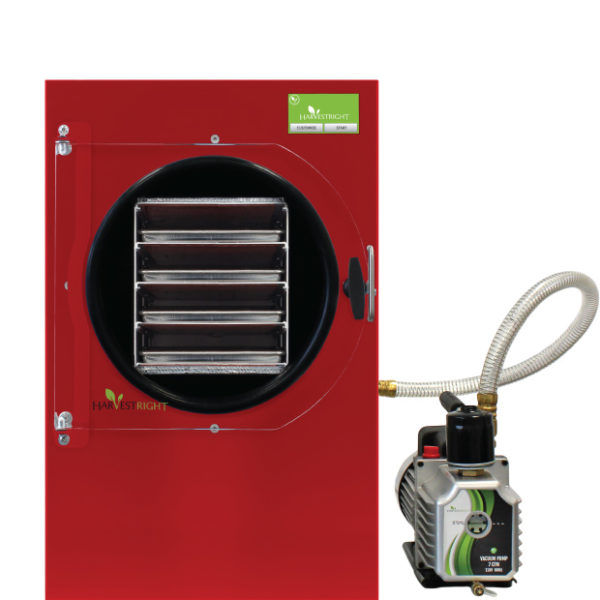
One of the most common topics amongst freeze dryer owners is whether or not the machine is “noisy”. While every person has a different tolerance for noise, it is safe to say that we live in noise saturation in today’s world. It can be eerily silent when there is a power outage, and people report not being able to sleep, or feeling very uncomfortable with the silence.
While some report that they keep their machine in the garage or basement to maintain the quiet in the home, others don’t seem to mind.
During the freeze cycle, the machine is acting as nothing more than a little freezer, and that is exactly how it sounds. There is a quiet hum. You may hear it, but it isn’t distracting.
When the vacuum pump kicks on, it settles quickly into white noise. It is noticeable, and you may turn the television up one more click, but it certainly won’t keep you from hearing your phone ring or stop your kids from hearing their music. In my mind, it reminds me of a dishwasher. You know it is there, but it won’t drive you away.
Our machine originally was to be placed in a side room off of our kitchen, but we decided to keep it in the center of the house for a while so we could monitor it and learn how it operated. Our dining room opens into the family room, and also has French doors into our master bedroom. Our sitting area and television are less than fifteen feet from the machine. We still hear the television, and we talk all evening. Our bed is literally eight feet from the machine, yet if we close the doors, we sleep like babies.
On several occasions, I have asked my husband if he would like me to move the unit into that back room, but he has told me repeatedly that he isn’t bothered at all by the noise, and he does like having it where we can hear it run.
Every load we run in our machine is another step toward food security. There is something amazing about knowing that when our machine shuts down after each batch, the end result is a shelf stable, lightweight, nutritionally intact product that will be there for us when we need it – whether that is 2 years or 25 years. We have never been concerned that the noise wasn’t worth the end result.
The freeze dyer is amazing technology. Harvest Right is continually improving their product, and someday it may be a quieter process. For most of us who own one, it really doesn’t matter. The quiet whirring of the compressor and the hum of the pump are simply the sounds of security.
If you wonder what food security sounds like, buy a freeze dryer and find out. You won’t regret it.

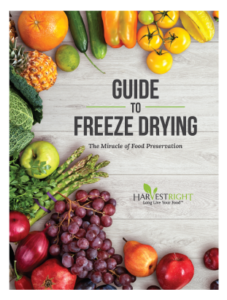
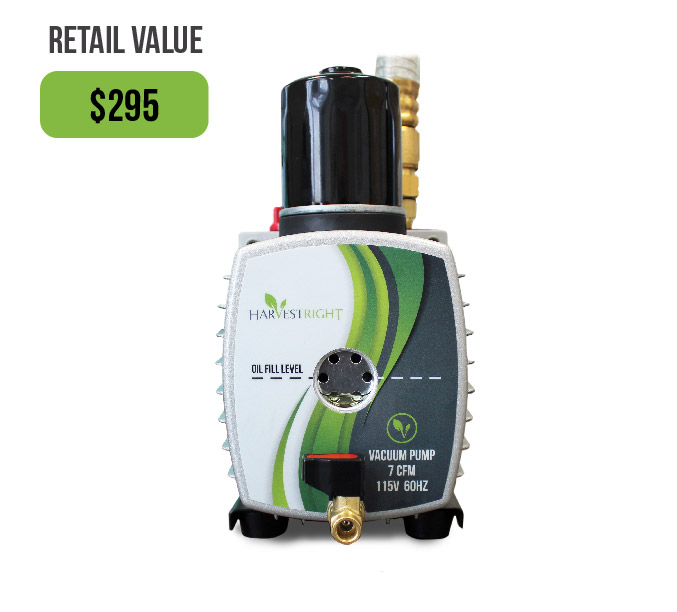
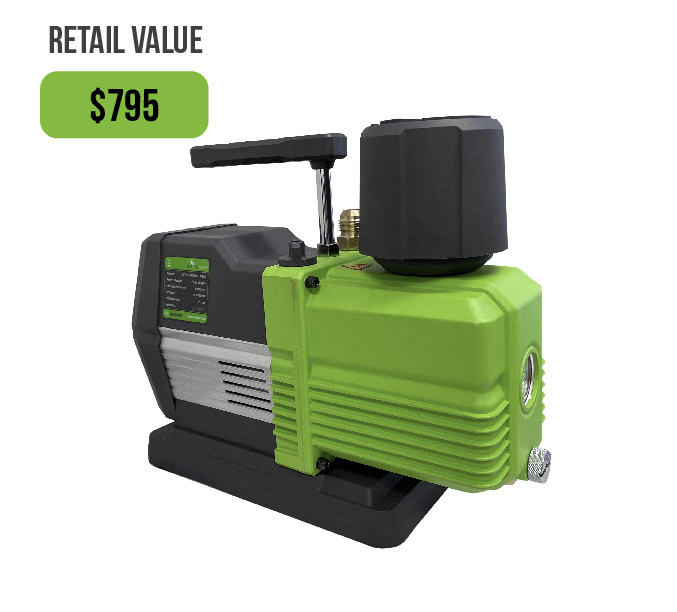
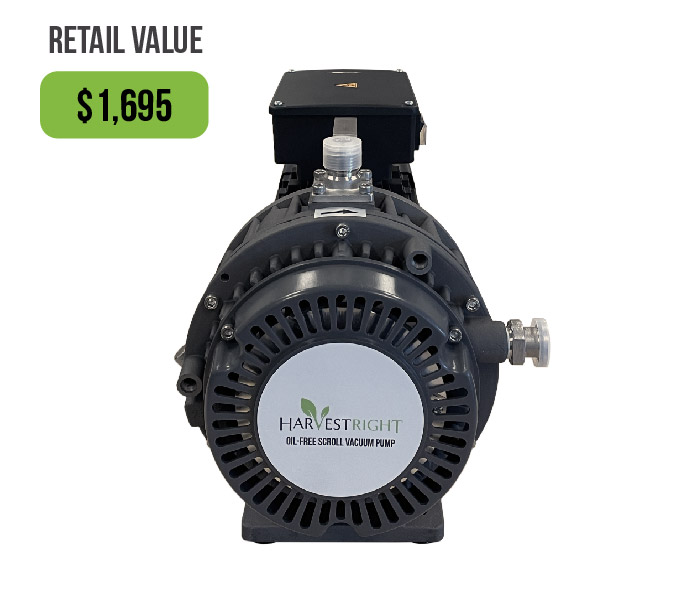
Isn’t your better scroll vacuum pump less noisy?
It is similar in noise to the oil vacuum pumps. The main benefit is no oil changes.
What about some bulletproof data (dBa)?
About ≤ 62 dB(A).
My Premier pump read 46.9 dB at 2 feet. Normal conversation is 60 to 70 dB.
I need to know if the exhaust has an odor that will attract fruit flies. We have orchards in the area and the fall fruit flies are a horrible nuisance. We need to keep numbers down in the house and garage.
Do you or your customers have an answer?
Thanks.
We have not had any customers tell us that this is an issue for them.
Does the oil pump or no oil pump model emit lot of heat? I project to buy one in the futur and my question is if it could be a good idea to build a wood box isolated to put in the oil pump (and the freezer on top of it). I live in apartment and would like to reduce the noise at maximum. Would probably need a fan setup for ventilation (like a PC). I dont find anything about that but I’m sure it could be a concern for peoples like me who live with side/under neighbors.
Like most products that have a motor, we don’t recommend enclosing it without proper ventilation. If vented properly, it would work.
Hello, I plugged a small 2-outlet extension into the back of the freeze dryer, where the pump plugs in. Then I plugged the pump and a small used air cleaner into that. Luckily it’s a cheap used air cleaner and I can just cut a regular size furnace air filter to put into it. So now whenever the pump turns on, the air cleaner does also, and circulates cool air around the pump, and also removes any oil smell. I was also able to remove any oil smell by placing some paper towels under the Premium Pump, and wrap one paper towel around the top black knob. Those catch any oil that might dribble out.
What temperature does the unit operate at. I live in Michigan where winter temps are below freezing. I would like to operate it in a uninsulated garage.
The recommended and ideal operating temps are 35 – 90 degrees F. Many operate in temperatures lower than that. Really hot temps in the 100’s are much more challenging.
The refrigerant portion of the freeze dryer will find it easier to remove heat from the chamber and dump heat to the atmosphere (that is how it works), when the atmosphere is cold. It is, therefore, more energy efficient in a cold atmosphere. The heating pads on the shelves, beneath the trays, operate in a vacuum. Consequently, very little heat is convectively transferred to the outside.
As Matt Neville said, hot atmospheric temperatures will cause the refrigerant system to struggle to dump sufficient heat to cool the chamber.
My opinion, take advantage of the free cooling in winter. It will lower your power consumption. In summer, it needs to be in the coolest location you can provide.
Warning: the coolant air needs to be filtered of dust, otherwise the heat exchange fins will get plugged with dust, which diminishes the air flow.
Does the freezers need surge protectors or does that cause problems with operations? Also, I have a 20 volt outlet that nothing else is plugged into but other outlets are on the same run. Will this work?
The site says this:
Small and Medium freeze dryers use a standard 110 volt outlet.
At peak, the freeze dryer draws about 16 amps, but on the average about 9 to 11 amps (990-1210 watts) of power per hour. A dedicated 20 amp circuit is recommended.
Large freeze dryer requires a 110 volt (NEMA 5-20) outlet
At peak, the large freeze dryer draws about 16 amps, but on the average about 10 amps (1500 watts) of power per hour. A dedicated 20 amp circuit is required.
(You meant 20 amps at 120 volts.)
It will work on that 20 ampere circuit. However, if you plug in anything else on that circuit that draws another 5 amps, you will trip the circuit breaker.
I speak from experience. I run an LED light with a remote control module plugged into a power strip on the same circuit. This draws less than 1 ampere. I made the mistake of accidentally plugging in the blow-dryer (that I use to expedite the defrosting) into that same power strip (confusing it with another power strip on a totally different breaker). The blow-dryer draws 15 amps. I knew better, but made a mistake. It promptly popped the circuit breaker. I unplugged the blow-dryer, plugged it in where I should have and reset the breaker. No problem.
I ordered a oil free pump if I place a silicone mat under the pump will it further reduce the noise some one on you tube used a piece of insulation board said it worked but will a silicone mat work as well.
What is the decibel difference between an oil pump and an oil free pump?I live in an apartment and would like to know what I can do to minimize the sound.Thank you.
The Standard Oil Pump is rated at 64 decibels, the Oil Free Pump is 62 Decibels, and the Premier Oil Pump is 52 decibels. If you are looking for a quiet option, the Premier Oil Pump is the most quiet.
Will the HARVEST RIGHT PREMIER VACUUM PUMP over heat if I put the pump in a custom-built sound dampening box?
thank you
We don’t recommend putting our vacuum pumps in very confined spaces. The premier pump puts out less heat than other pumps, but it is still not a good idea.
I wouldn’t suggest placing it in anything. it needs air circulating in open atmosphere even if box had some perforations
How long is the vacuum pump loud for before it turns into a hum?
Also, I didn’t receive an insulation pad with my unit and all the videos show to put one on.. are we supposed to buy that separately or does it even need one?
It does not need the door pad. Those were discontinued a long time ago.
An insulation pad does reduce somewhat the heat that enters through the door. It makes about a 30 minute difference in run time per day of operation. Evidence can be seen in the condensation of humidity on the door. Not necessary, but helpful. However, then you can’t see what is inside.
A door insulator can be made from foam board. It can be mounted externally or internally on the door. One inch foam board fits internally. No limit to foam board thickness outside the door.
We have the medium freeze drier and want to know if we should have it connected to a surge protector to protect our unit? If so what type surge protector would you recommend? How many joules are needed?
Use of a surge protector is a wise move, in order to protect the equipment (especially the computer circuitry) from surges from nearby motor starting surges and from lightning strikes down the powerline. However, you can’t really obtain a high enough joule rating to stop everything. You can stop the small surges, but not a very nearby lightning strike or EMP. Use as high a joule rating as you can afford. It is cheap insurance to protect your investment.
Can the newest white oil-less pump support the large freeze dryer’s capacity? Or would the premier pump work better? Which pump do you recommend? We do understand the oil-less pump is additional dollars but just want to buy the best pump for the large.
Does the Premium Oil Pump run during the whole process, in other words does it produce noise during the entire 24 to 48 hours.
It is on for part of the process. Typically about 2/3 of the time. It is the quietest vacuum pump however.
Was considering putting the medium where my dishwasher is, leaving room on one side for the pump. Since it is recommended to not enclose the unit would a fan help or can I place the pump out front on the tile of the kitchen? We have a small cabin so space is obviously important.
In the event of a power blackout, and the dryer turns off due to lack of power, what happens to the freeze dryer cycle that was interrupted? Does it start back up where it left off or is it defaulted to OFF and tuff luck for the produce you were drying.
If a power outage occurs it will start where it left off.
There could be a few different answers depending on for how long the power is off and what part of the cycle it interrupts. Even if it resumes you might want to assess if there is water or any ice melting and pooling in the bottom. If it’s near beginning freeze mode your probably better off salvaging and resuming the batch with maybe added dry time at the end. With high scrutiny, I would treat it like a better dehydrated food item and just use it short term, versus sealed in Mylar.
I see many people using a small fan to keep their pump motor cool. Is this recommended?
Thank you